Originally published at Tostada Magazine by Serena Maria Daniels
Nancy Lopez’s eyes light up whenever she talks about the community she’s building around food in Southwest Detroit.
Speaking with her at her outdoor taquería situated at the former La Terraza on Lawndale, Lopez explains that she wants to recreate what is so quintessential to her hometown of Guadalajara: this idea of a cobblestone-lined public square where people can easily walk to, gather around Spanish colonial architecture in a communal space, where live mariachi, open-air markets and fresh food stands and fruterías abound.
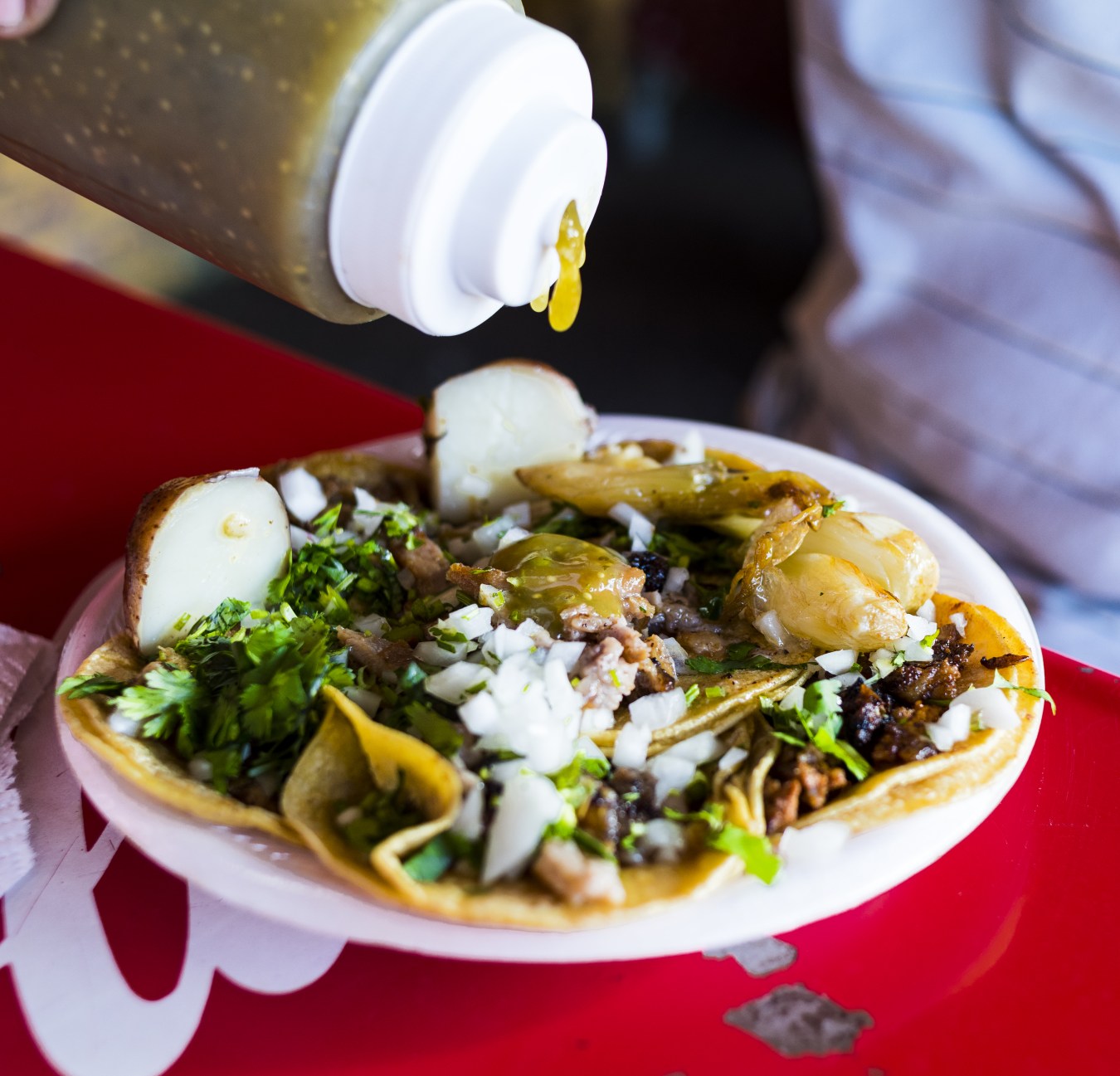

“The concept of walking to the corner store and you could ask for a jugo or a Choco Milk, it’s something that needs to be done here,” she tells Tostada Magazine. “It’s something that’s already being done in places where there’s a bigger community of Hispanics but we’re getting there.”
Indeed Lopez, the mastermind behind the growing chain of El Parian taco trucks, is well on her way to doing just that.
You can’t miss their four trailers that dot several street corners throughout the neighborhood. They’re wrapped in images of iconic scenes from Mexico’s Golden Age of Cinema, the majestic agave so prevalent of the highlands of Jalisco accented with colorful papel picado, or the colonial architecture reflective of El Parian — the vibrant plaza outside of Guadalajara reminiscent of the countless zócalos throughout the Latin American country (and also the namesake of the mobile taquería chain).
On any given summer afternoon, lines are sure to be wrapped around these trucks and for good reason. El Parian’s tacos al pastor are arguably the best in the city. The delectable pork is marinated in a blend of chilies, spices, and pineapple. Slow-cooked on a trompo and an open flame until all the flavor is caramelized, the result is a tender meat full of flavor that’s both picoso and slightly sweet. When you order a plate, the taquero behind the counter shaves a bed of that thinly sliced protein upon freshly-made corn tortillas and tops it with a smidge of piña that’s also flame cooked on the spit.
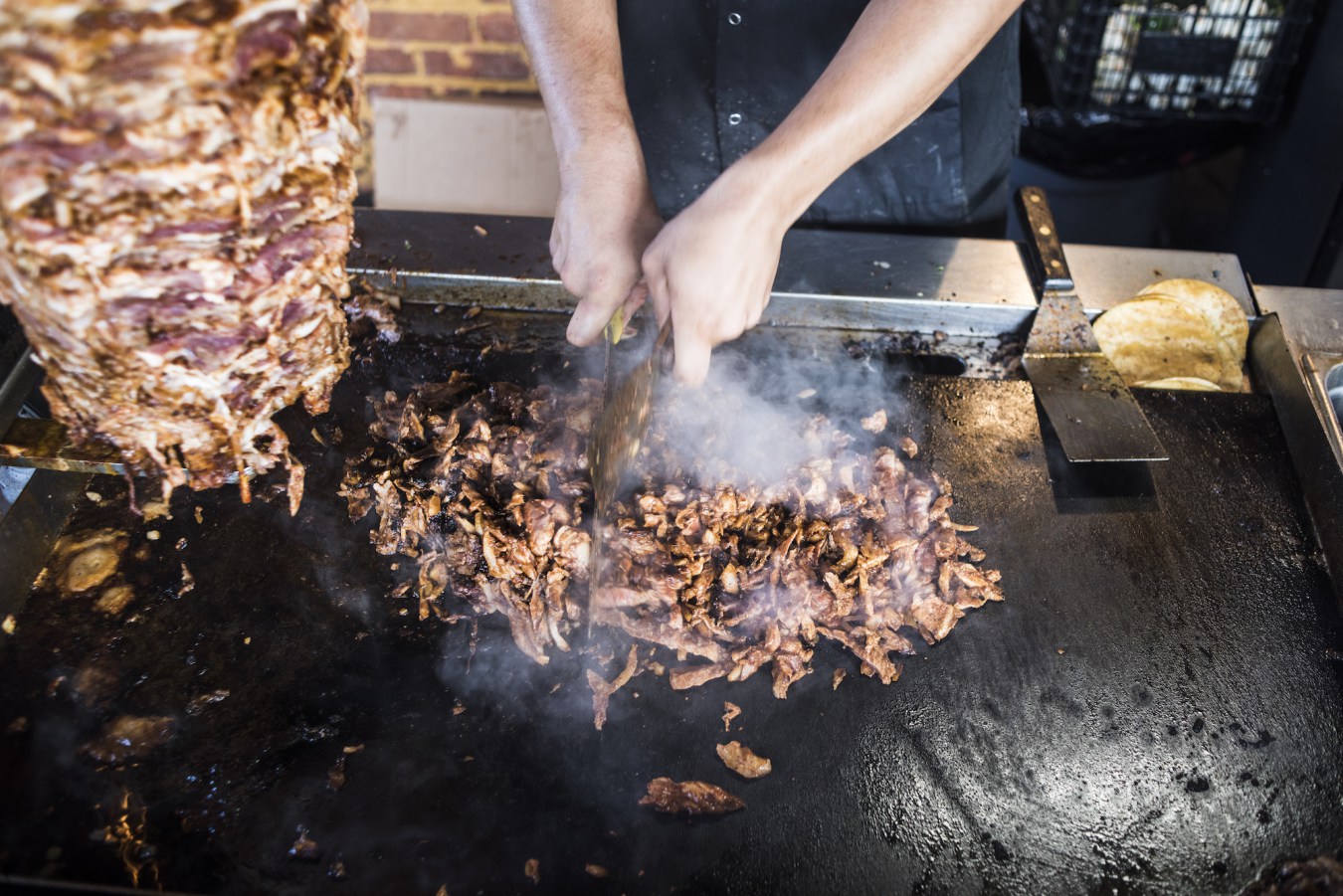

In its eight or so years in operation, Parian has grown to include a seafood truck with mariscos, that fixed outdoor taqueria on Lawndale and this year, Lopez and her husband/business partner Ramon “Wicho” Diaz are testing out a new mobile eatery, Wicho’s Burgers featuring the chain’s famous Hawaiian burger—a subtle riff on the original al pastor.
With no plans of slowing its growth, El Parian started with a single taco truck.
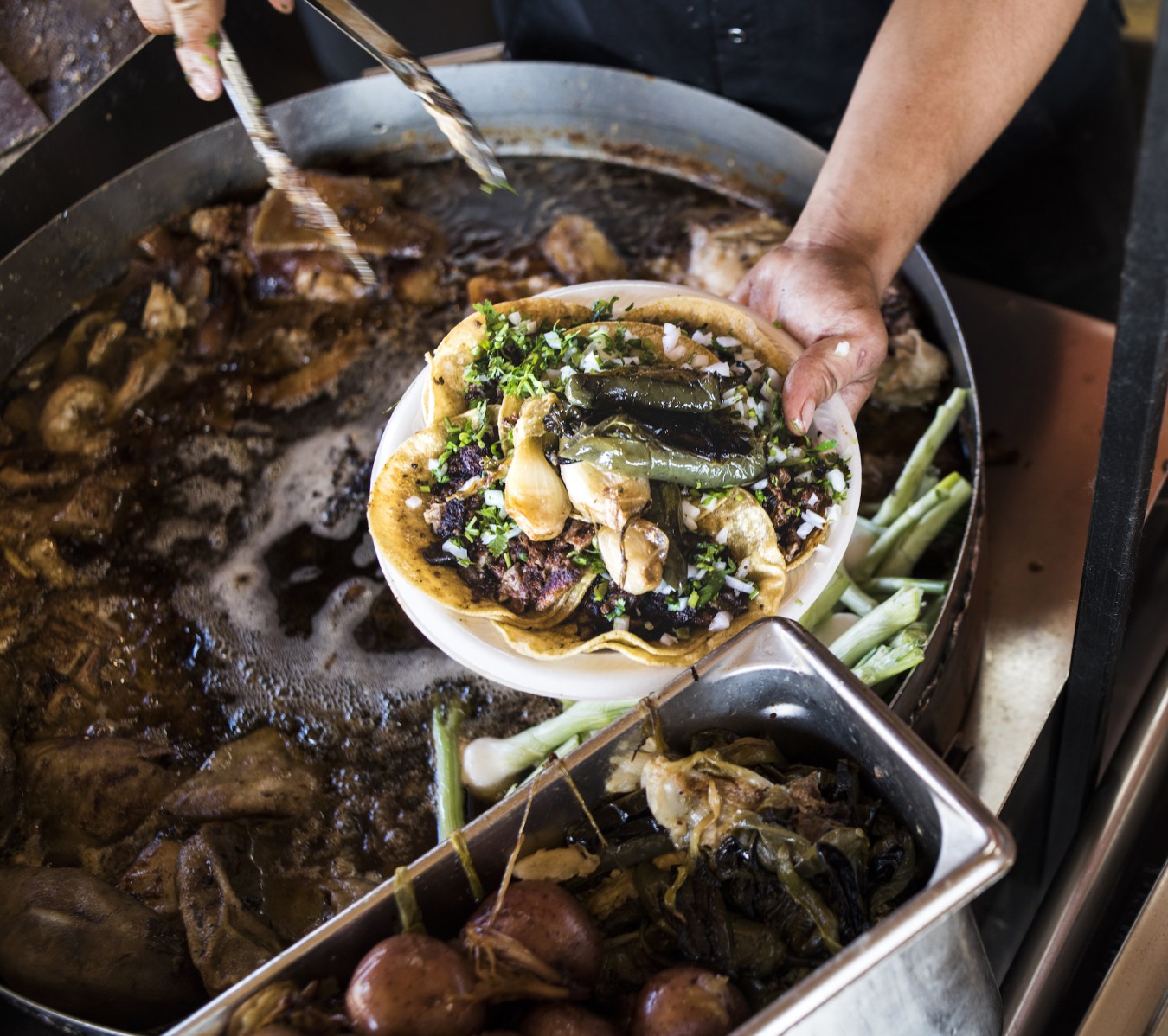

Lopez tells Tostada Magazine that her first experiences working in restaurants started at the age of 14 when relatives opened Los Altos Restaurant on Vernor Highway. Her parents eventually purchased a food truck, which her father managed on the weekends on his days off from working construction. At the height of the recession with bills piling up, Lopez says she and Diaz volunteered to help out with the truck, at first for just enough to make some extra money.
At the time, the taco truck had no name and nothing really distinguished it from the other taqueros in the neighborhood. It didn’t take long for the couple to envision something more unique.
“Our parents gave us the opportunity and we made it into El Parian,” she says.
Within a year, the duo quit their day jobs and took over full-time. As for the name, Lopez’s mother came up with the idea, looking to their hometown for inspiration.
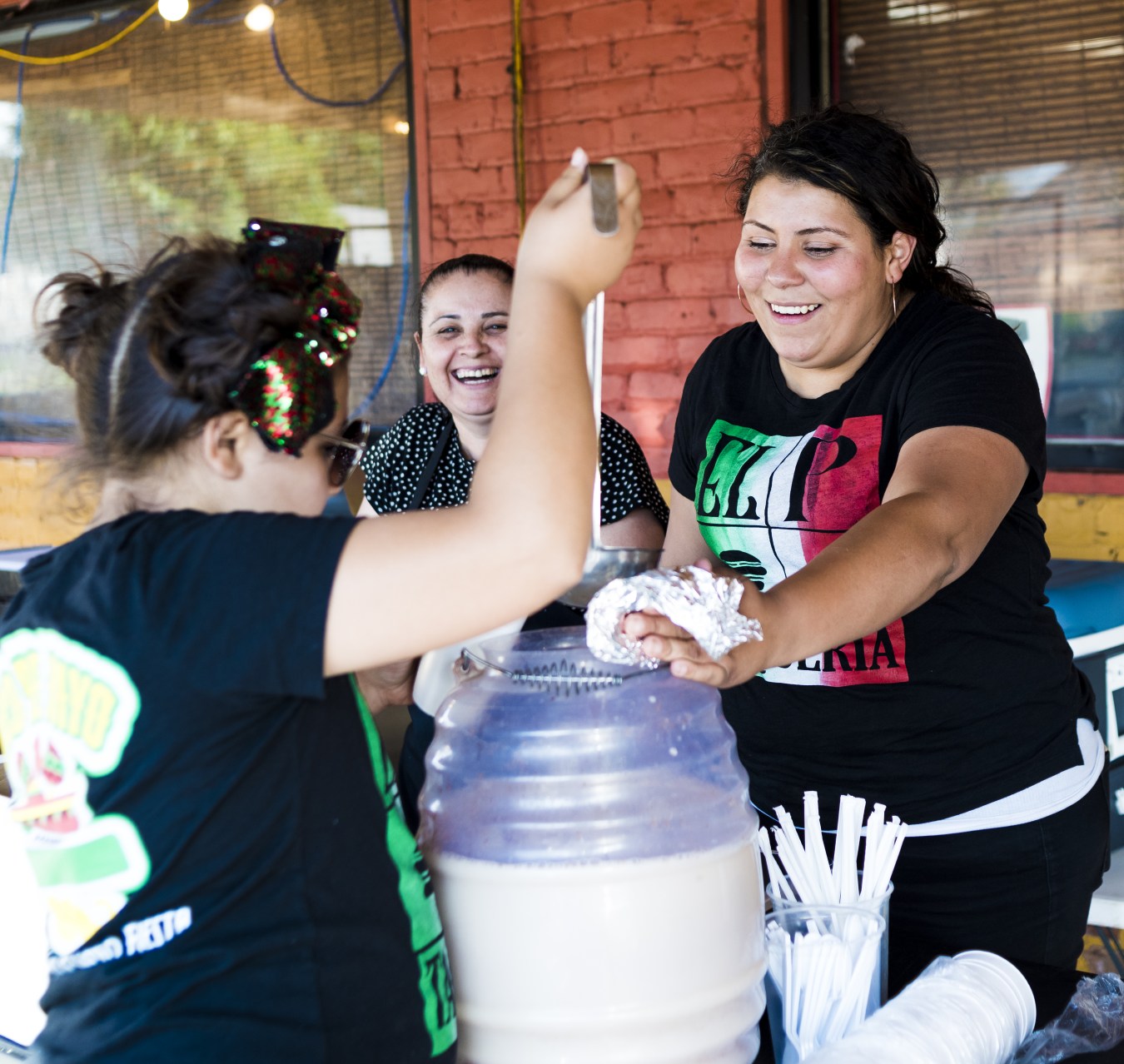

Nancy Lopez, right, and daughter Victoria, 10, preparing a cup of horchata for a customer.
To set themselves apart from others in town, Lopez says she and Diaz started by perfecting their al pastor.
“When you go to the taco stand, you see the little trompo going ’round and ’round, you’re cutting it down, you’re getting your meat for the taco,” she says. “So I think that’s what kind of identified us and also the flavor, I mean, every restaurant has their own recipe for it… but I think it’s the trompo that makes it.”
They also tweaked that original recipe and imagined other menu items by drawing from both their Mexican and American influences. They already utilized the piña at the top of the trompo, for example. So they expanded on the idea of a Hawaiian pizza to create the popular Hawaiian burger. As for the design of the fleet, rather than stick with the standard white truck, they wrap each trailer with vinyl signage replete with imagery that pays homage to back home.
“We tried to give it all the vibes of El Parian, and of what Mexico is,” Lopez adds.
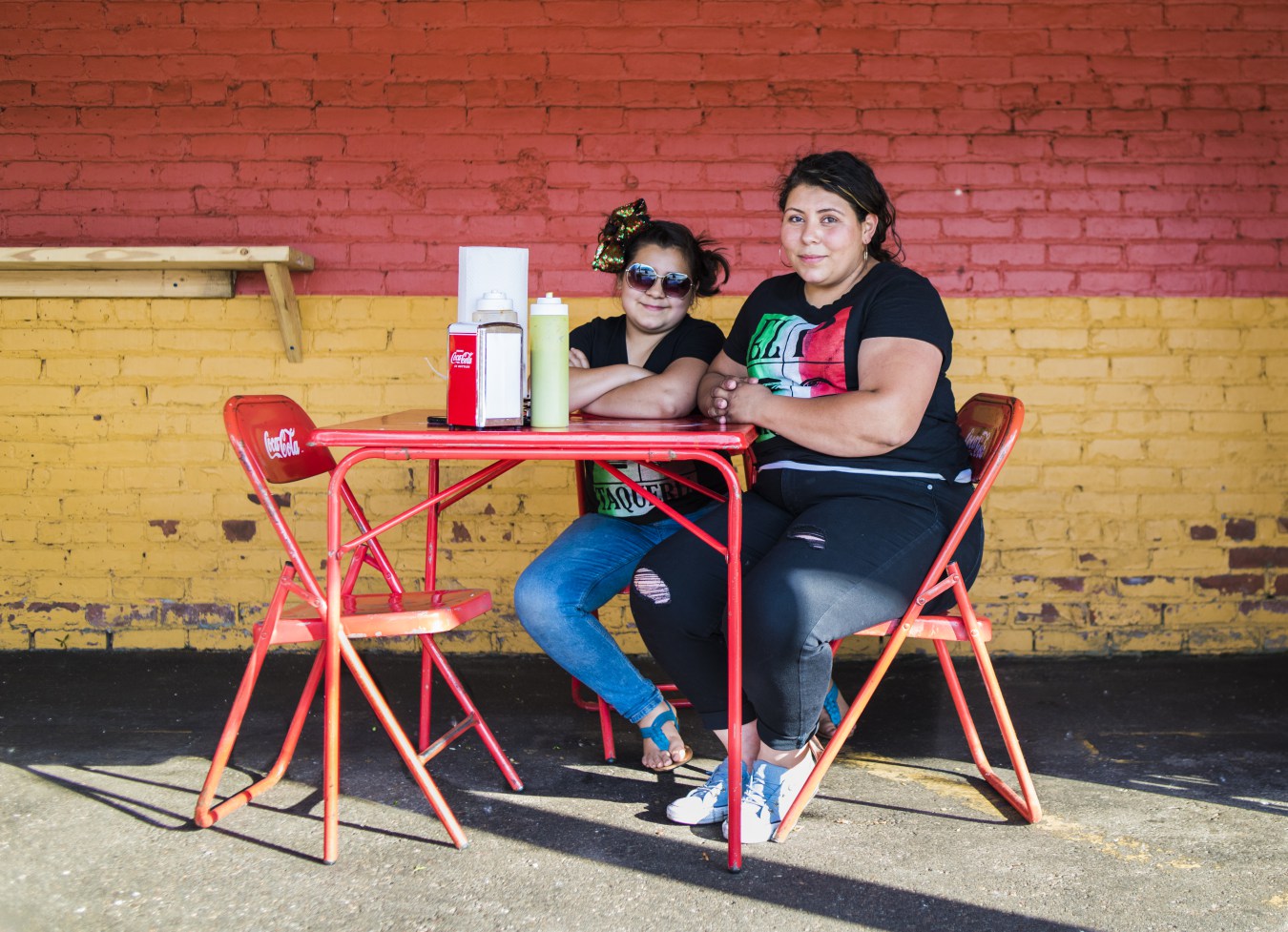

Nancy Lopez, right, with daughter Victoria, 10.
El Parian’s style is a reflection of the more innovative direction younger first-generation Mexican-Americans are taking with the food scene locally. While the generations-old establishments along Bagley in Mexicantown tend toward more of a Tex-Mex vibe with dishes laden in melted cheese, “Spanish” rice and refried beans, the newer spots like Mariscos El Salpicon with its Instagram-worthy Piña Suprema shrimp cocktail doused in chamoy, the flavor bomb dorielotes at Mangonadas del Barrio and El Asador’s all-halal steaks are redefining Detroiters’ understanding of what Mexican food can be.
The chain’s success is also a sign that despite concerns over gentrification in the barrio, businesses like El Parian are working to not just maintain a stronghold in Latinx-ownership, but to continue elevating it.
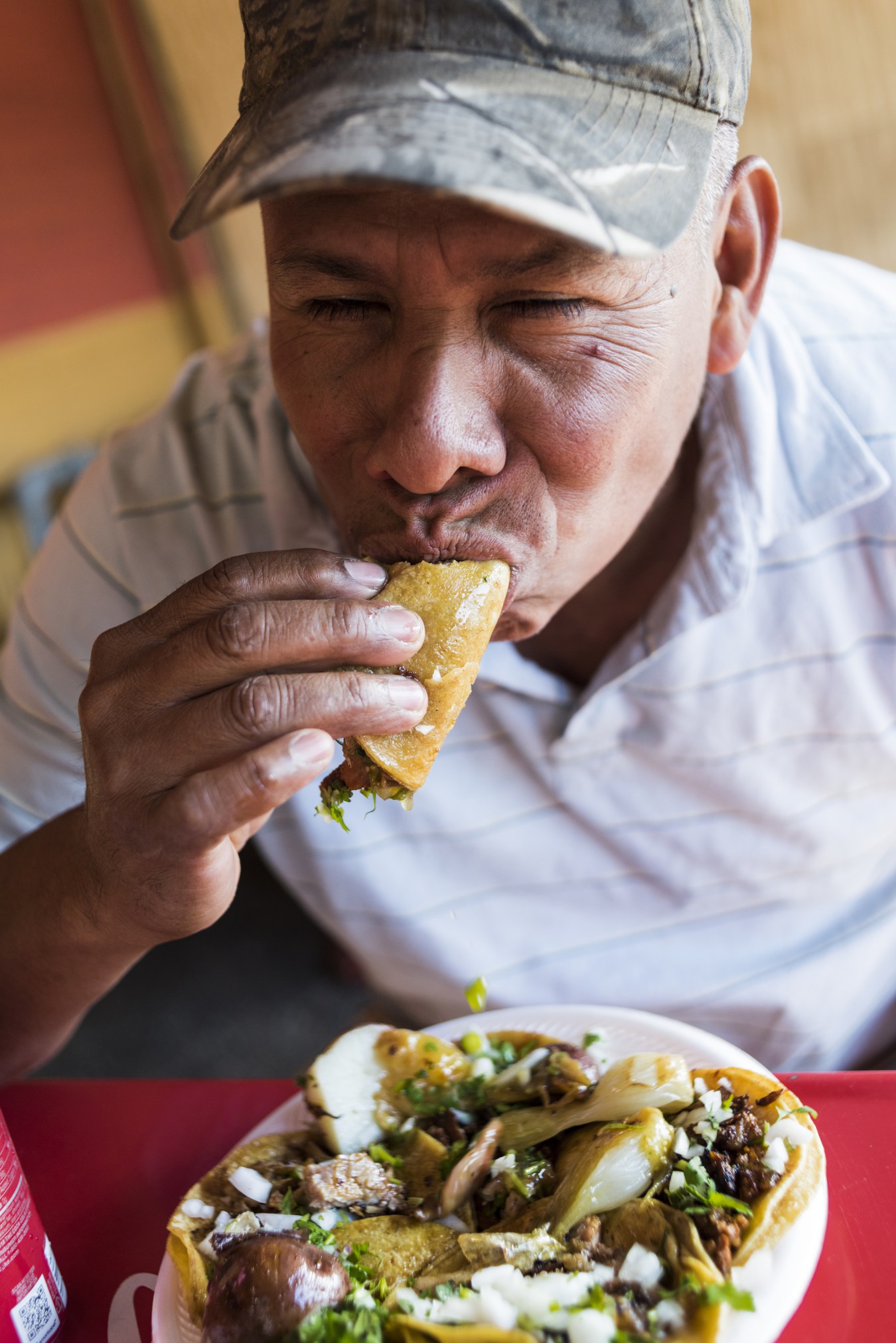

A customer digs into a plate of tacos.
While Lopez says the business is an equal partnership with her husband, it’s really up to her to take their shared vision and hustle to make it a reality. If one has an idea for a new menu item, add a new location, or even find the vintage red Coke tables and chairs found at the taco stand, it’s up to her to figure out how to implement it. Diaz manages “back-of-house” responsibilities at the trucks, while Lopez juggles getting their three kids ready for school, daily grocery runs for supplies, followed by dropping things off at each truck and taking orders behind the window to give others a break. The workday can end at 1 a.m., but even after that, the couple is up even later, their minds still humming from a long day of activity.
El Parian now has four full-time taco trucks, plus one for special events and Wicho’s, which is not quite permanent yet (Lopez has a temporary permit for that location as they test out its success). The star at Wicho’s, of course, is the Hawaiian, along with the Mexican burger loaded with grilled onions and jalapeños, cheese, avocado, and chimichurri. Other varieties are available in shrimp and turkey. For fries, diners can go with the choripapas, loaded with chorizo, lettuce, avocado and chimichurri sauce. Down the line, Lopez would like to see fresh, all-natural juices and Mexican shakes added to their offerings. And as for the outdoor patio eatery, which first opened last summer, she says they’re looking forward to providing indoor seating at some point for when the weather turns while maintaining that kitchen space as a commissary for the trucks.
While Lopez stops short of saying whether they ever hope to take their family’s growing taco truck empire from mobile to brick and mortar, she does marvel at its evolution thus far.
Turning to her oldest, Victoria, 10, she says: “At first when you start, it’s because you want something better for you, then you continue to build because you want something better for them.”
El Parian has locations at Springwells just off I-75, at Waterman and Dix, and two on Vernor, one at Ferdinand and another one next to the old Secretary of State by Huntington Bank. Wicho’s is also on Vernor next to O’Reilly’s Auto Parts. The taco stand is at 1633 Lawndale.
***
(All photos by Rosa Maria Zamarron. Check out more of her work on camera on her website or on Instagram @the_zamarron)
This article was made possible by the Detroit Journalism Engagement Fund, a project of the Community Foundation for Southeast Michigan, that’s working to increase quality journalism and help better inform communities.
Tostada Magazine is journalism that speaks to the rich culture of Metro Detroit’s food scene. We seek to shift the focus of food writing in the Detroit area by bringing the voices of our communities to the forefront of the conversation. Serena Maria Daniels is the co-founder and head chingona of Tostada Magazine. She is an award-winning journalist based in Detroit and specializes on the intersection of food, identity, and culture.


